| 10 August |
• yesterday • tomorrow |
| Feast of Saint Lawrence, Deacon and Martyr |
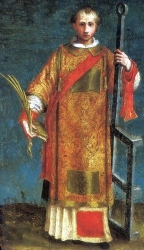
Laurence, Laurent, Laurentius, Lorenço, Lorenzo
Third-century archdeacon of Rome, distributor of alms, and "keeper of the treasures of the church" in a time when Christianity was outlawed. On 6 August 258, by decree of Emperor Valerian, Pope Saint Sixtus II and six deacons were beheaded, leaving Lawrence as the ranking Church official in Rome.
While in prison awaiting execution Sixtus reassured Lawrence that he was not being left behind; they would be reunited in four days. Lawrence saw this time as an opportunity to disperse the material wealth of the church before the Roman authorities could lay their hands on it. On 10 August Lawrence was commanded to appear for his execution, and to bring along the treasure with which he had been entrusted by the pope. When he arrived, the archdeacon was accompanied by a multitude of Rome's crippled, blind, sick, and indigent. He announced that these were the true treasures of the Church. Martyr.
Lawrence's care for the poor, the ill, and the neglected have led to his patronage of them. His work to save the material wealth of the Church, including its documents, brought librarians and those in related fields to see him as a patron, and to ask for his intercession. And his incredible strength and courage when being grilled to death led to his patronage of cooks and those who work in or supply things to the kitchen. The meteor shower that follows the passage of the Swift-Tuttle comet was known in the middle ages as the "burning tears of Saint Lawrence" because they appear at the same time as Lawrence's feast.
at Huesca, Spain
• cooked to death on a gridiron on 10 August 258 in Rome, Italy
• tradition says that the ashes of his burned body were dispersed by the winds, and appear at different places around the world on his feast day
• buried in the cemetery of Saint Cyriaca on the road to Tivoli, Italy
• tomb was later opened by Pelagius to inter the body of Saint Stephen the Martyr
• his mummified head is enshrined at the Quirinal Chapel of the Vatican Apostolic Library in Rome
• other relics and the gridiron believes to have been his deathbed are enshrined in the crypt of the Basilica of San Lorenzo Outside the Walls, Rome
• his garments are enshrined in Our Lady’s Chapel in the Lateran Palace, Rome
• against fire
• against lumbago
• archives, archivists
• armories, armourers
• brewers
• butchers
• chefs, cooks
• comedians, comediennes, comics
• confectioners
• cutlers
• deacons
• glaziers
• laundry workers
• librarians, libraries
• paupers, poor people
• restauranteurs
• schoolchildren, students
• seminarians
• stained glass workers
• tanners
• vine growers, vintners, wine makers
• ---
• Ceylon, Sri Lanka
• ---
• 38 cities and dioceses
• book of Gospels
• cross
• gridiron
• deacon holding a book
• deacon holding a gridiron
• deacon holding a bag of money
• purse of money
With the robe of joyfulness, alleluya,
Our Lord hath this day clothed His soldier, Laurence.
May Thy faithful's joyous assemblage clap their hands
More cheerfully than they have heretofore.
Today the noble martyr offered pleasing sacrifice to God,
Today he, being grievously tested,
Endured unto the end the torment of his fire;
And shrank not from offering his limbs to punishments most grievous.
Before the ruler he is summoned,
And settlement is made upon the Church's hidden holdings.
But he by words enticing is unmoved, and is unshaken
By the torments of the ruler's avarice.
Valerian is laughed to scorn,
And the Levite's liberal hand,
When he is asked for payments,
Giveth to the gathered poor.
For he was their minister of charity,
Giving them abundance from his means.
Therefore the prefect is enraged,
And a glowing bed made ready.
The torment-bearing instrument,
The gridiron of his suffering,
Roasteth his very viscera,
But he laugheth it to scorn.
The martyr sweateth in his agony,
In hopes of crown and recompense
Which is allotted those with faith,
Who struggle for the sake of Christ.
The court of heaven rejoiceth
For his warfare-waging,
For he hath prevailed this day
Against the lackeys of wickedness.
That we, then, may attain the gift of life,
By this our patron, be glad, O our choir,
Singing in the church upon his feast-day
A joyful alleluya.
- from the Mass of Saint Laurence, Old Sarum Rite Missal
O Laurence, thou David, thou great-martyr,
Thou mighty warrior and judgment-seat of the Emperor,
Thou didst set at nought the blood-stained hands
Of thy tormentors.
Thou wast a follower of Him Who is desirable and mighty,
Who with His hand alone can conquer the cruel despot's strongholds,
And Whose love maketh His warriors holy,
And generous with their blood.
Insofar as thou sawest Him in the loss of this present life,
Thou didst scorn the emblems of the Caesar, and laugh the judge's threats to scorn.
In vain it is the headsman rendeth thy fingernails,
It is in vain the pyre's burning thy gridiron doth enfold.
The impious man, the City's prefect grieveth,
Conquered by a broiled fish - the food of Christ.
This honeycomb of the Lord rejoiceth, living with Him,
Rising again with Him, filled to the full with Christ.
O Laurence, wreathed with laurel amongst warriors,
O unconquerable David of the everlasting King:
Ever entreat with Him to pardon His lowest servants,
O martyr and mighty foot-soldier!
- from the Mass for the Octave (Apodosis) of Saint Laurence, 17 August, Old Sarum Rite Missal
The Roman Church commends to us today the anniversary of the triumph of Saint Lawrence. For on this day he trod the furious pagan world underfoot and flung aside its allurements, and so gained victory over Satan's attack on his faith.
As you have often heard, Lawrence was a deacon of the Church at Rome. There he ministered the sacred blood of Christ; there for the sake of Christ's name he poured out his own blood. Saint John the apostle was evidently teaching us about the mystery of the Lord's supper when he wrote: "Just as Christ laid down his life for us, so we ought to lay down our lives for the brethren." My brethren, Lawrence understood this and, understanding, he acted on it. In his life he loved Christ; in his death he followed in his footsteps.
Brethren, we too must imitate Christ if we truly love him. We shall not be able to render better return on that love than by modeling our lives on his. "Christ suffered for us, leaving us an example, that we should follow in his steps." The holy martyrs followed Christ even to shedding their life's blood, even to reproducing the very likeness of his passion. They followed him, but not they alone. It is not true that the bridge was broken after the martyrs crossed; nor is it true that after they had drunk from it, the fountain of eternal life dried up.
On no account may any class of people despair, thinking that God has not called them. Christ suffered for all. What the Scriptures say of him is true: "He desires all men to be saved and to come to knowledge of the truth."
I tell you again and again, my brethren, that on no account may any class of people despair, thinking that God has not called them. Christ suffered for all. What the Scriptures say of him is true: "He desires all men to be saved and to come to knowledge of the truth." - from a sermon by Saint Augustine
O Lord Jesus Christ, who did show thy blessed martyr Laurence, despising this world, to be most pure gold, which the fire might by no means consume, but only prove; so that, the fiercer was the flame, the more brightly the gold shone: grant unto us, that the flames of concupiscence may have no power to burn up those who are enlightened by such a shining example as that of thy holy martyr. - Mozarabic Sacramentary
https://catholicsaints.info/saint-lawrence-of-rome/
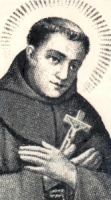
• Amadeus Menez de Silva
• Amedeus....
• João de Menezes da Silva
• João Mendes de Silva
• Peter John Silva Meneses
Born to the Portugese nobility, the youngest of eleven children of Rui Gomes, the Count of Viana, and Isabel de Menezes; brother of Saint Beatrice da Silva Meneses. Courtier to Empress Eleonaora of Portugal. Married briefly. Monk at the Hieronymite monastery of Santa María de Guadalupe for ten years. Entered the Franciscans in 1453 in Assisi, Italy as a lay brother. Hermit. Ordained in 1459. Founded the monastery Virgin of Peace near Milan, Italy and led a community under strict Franciscan rules; they were known as the Amadeistene, Amadeeërs or Marignano reform, and at one point there were 28 houses following their example, but all eventually merged with the Franciscans. Wrote on prophesy, and a commentary on the Book of Revelations. Amadeus's work was praised by Pope Sixtus IV, King Ferdinand the Catholic of Aragon, and Saint Louis IX of France.
1420 in Morocco as João de Menezes da Silva
• 10 August 1482 in Milan, Italy of natural causes
• buried under the high altar of his monastery in Milan
against fever (water from a spring at his monastery was reported to heal fever patients)
https://catholicsaints.info/blessed-amadeus-of-portugal/

Besso, Besse
Soldier of the Theban Legion. Convert to Christianity. He escaped the massacre of the Legion and became an evangelist in the mountain district of Val Soana. Reported to be a miracle worker and able to heal by prayer. Martyr.
Because of the understandably poor records from the period, and the similarity of his name both to other evangelists in the region and to a pre-Christian god, Bessus has figured into a lot of folk tales, practices and later legends.
• thrown from Mount Fautenio c.286 Campiglia Soana, Turin, Italy
• the spot where he landed (and died) left an impression in the rock, and a shrine was soon built over it
• relics taken to Ozegna in the 9th century and enshrined a chapel now known as the Beata Vergine del Convento e del Bosco
• relics later taken to the cathedral of Virea, Italy and enshrined in a sacrophagus
• relics later enshrined in a side altar in the cathedral with those of several other martyr saints
• soldiers
• for fertility
• Campiglia Soana, Italy
• Cogne, Italy
• Ivrea, Italy
• Valprato Soana, Italy
• soldier holding a banner with the Mauritian Cross
• soldier holding a banner reading "ICTUS"
• palm of martyrdom
• spade; shovel
• helmet with ostrich feathers
https://catholicsaints.info/saint-bessus/
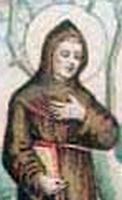
Arcangelo Placenza
Born to the nobility. Known as a quiet and pious child, it was no surprise when he went to live as a hermit in a cave near the church of Santa Maria dei Giubino in Sicily. His reputation for holiness spread, and the young hermit attracted would-be spiritual students - which caused him to move to Alcamo, Sicily to get away from them. His reputation went with him, and he was asked to restore broken down shelters for the poor in the area. The job finished, Arcangelo returned to his hermitage. However, Pope Martin V, working to restore papal authority, decreed that all hermits in Sicily should join approved religious orders; and so Arcanglo joined the Franciscans in Palermo, receiving the habit from Blessed Matthew of Girgenti. Priest. Assigned to establish a new Franciscan house in Alcamo; he used part of the structures he had helped to restore. He led both his brothers and the laity by his example, supported Franciscans throughout Sicily, turned down the bishopric in Alcamo, and spent his last days helping Blessed Matthew.
c.1390 at Calatafimi, Sicily, Italy
10 August 1460 in Alcamo, Sicily, Italy of natural causes
9 September 1836 by Pope Gregory XVI (cultus confirmed)
https://catholicsaints.info/blessed-archangelus-piacentini/
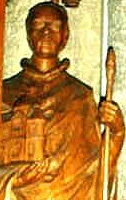
Blaan, Blan, Blain
Nephew of Saint Cathan. Studied in Ireland under Saint Comgall of Bangor, Saint Kenneth, and Saint Canice. Monk. After seven years, he returned to Scotland; tradition says he travelled in a boat without oars or rudder, but that it took him safely home. Monk at the monstery founded by Cathan; ordained by his uncle. Missionary to the Scottish Picts. Bishop of Kingarth, Scotland, ordained by Cathen. Pilgrim to Rome to seek papal blessing on his bishopric; made the return trip entirely on foot.
Reputed miracle worker, including bringing the young son of a British chief back to life, curing the blind, and lighting fire by making small bolts of lightning jump between his fingers. Devotion to Blane soon followed his death, was widespread in Scotland, and very popular; his monastery became the site of the cathedral of Dunblane, Scotland and there were several churches with his name.
6th century at Isle of Bute, Scotland
• c.590 at Kingarth, Isle of Bute, Scotland of natural causes
• buried in Dunblane, Scotland which was named for him
https://catholicsaints.info/saint-blane/
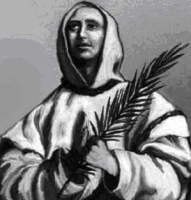
Joined the Carthusians on 18 December 1769 at the monastery of Fontenay, France. Priest. Served as vicar of his house until June 1791 when the monastery was suppressed by the civil authorities of the French Revolution. Arrested on 19 April 1793 for refusing to take the oath that would have switched his allegience from the Vatican to the civil authorities of the Revolution. Imprisoned on a ship in the harbor of Rochefort, France and left to die. There he ministered to other prisoners, hearing confessions, doing what little he could for the sick. One of the Martyrs of the Hulks of Rochefort.
29 March 1739 in Semur-en-Auxois, Diocese of Sens-Auxerre, Côte-d'Or, France
• 10 August 1794 aboard the prison ship Washington, in Rochefort, Charente-Maritime, France of a fever
• buried on the island of Aix, France
1 October 1995 by Pope John Paul II
https://catholicsaints.info/blessed-lazare-tiersot/
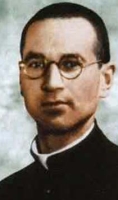
12 June as one of the 108 Martyrs of World War II
Orionist friar. After studies at the mother-house in Tortona, Italy, he was ordained on 6 June 1936. Returning to Poland, he taught at the college of Zdunska Wola. Parish priest in Wloclawek, Poland. Arrested on 7 November 1939 and condemned to forced labour at the Dachau concentration camp farms during the Nazi persecutions; he kept consecrated hosts in a small box he wore around his neck, and spent his time in the fields in Eucharistic adoration. Martyr.
26 February 1908 in Zduny, Lódzkie, Poland
gassed on 10 August 1942 at the prison camp at Dachau, Oberbayern, Germany
13 June 1999 by Pope John Paul II in Warsaw, Poland
https://catholicsaints.info/blessed-franciszek-drzewiecki/
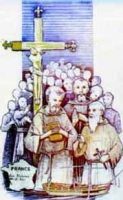
Sébastien of Nancy
Franciscan Capuchin priest. Imprisoned on a ship in the harbor of Rochefort, France and left to die during the anti-Catholic persecutions of the French Revolution. One of the Martyrs of the Hulks of Rochefort.
17 January 1749 in Nancy, Meurthe-et-Moselle, France
10 August 1794 aboard the prison ship Deux-Associés, in Rochefort, Charente-Maritime, France
1 October 1995 by Pope John Paul II
https://catholicsaints.info/blessed-francois-francois/

Sulpician priest. Imprisoned on a ship in the harbor of Rochefort, France and left to die during the anti-Catholic persecutions of the French Revolution. One of the Martyrs of the Hulks of Rochefort.
23 December 1752 in Gannat, Allier, France
10 August 1794 aboard the prison ship Deux-Associés, in Rochefort, Charente-Maritime, France
1 October 1995 by Pope John Paul II
https://catholicsaints.info/blessed-claude-joseph-jouffret-de-bonnefont/
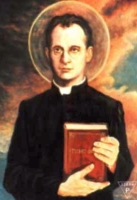
12 June as one of the 108 Martyrs of World War II
Priest in the diocese of Wloclawek, Poland. Imprisoned and murdered in the Nazi persecutions. Martyr.
19 September 1906 in Kolodziaz, Podlaskie, Poland
gassed on 10 August 1942 at the prison camp at Dachau, Oberbayern, Germany
13 June 1999 by Pope John Paul II in Warsaw, Poland
https://catholicsaints.info/blessed-edward-grzymala/
Augustinus Ota
Worked as a catechist, helping Jesuit missionaries. Imprisoned at Ikinoshima for his faith. While imprisoned, he was received into the Jesuits. Martyr.
1572 in Ojika, Goto-retto, Nagasaki, Japan
beheaded 10 August 1622 at Ikinoshima, Japan
7 May 1867 by Pope Blessed Pius IX
https://catholicsaints.info/blessed-augustine-ota/
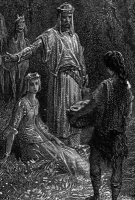
Geraint
King of Damnonia (in modern Devon, England). He and his wife Enid are the subjects of romantic legends in the region.
killed c.508 in battle against Saxons
https://catholicsaints.info/saint-gerontius/
Hesteria
Sister of Saint Grata of Bergamo. Worked to provide Christian burial for martyrs. Executed by Diocletian for doing it. Martyr.
• beheaded c.307
• venerated in Bergamo, Italy
https://catholicsaints.info/saint-asteria-of-bergamo/
Aguilberta, Gilberta
Related to Saint Ebrigisil, Saint Ado of Jouarre, and Saint Agilbert of Paris. Nun. Abbess of Jouarre Abbey c.660.
c.680
https://catholicsaints.info/saint-agilberta-of-jouarre/
Nephew of Saint Hugh of Cluny, who was his teacher and spiritual director. Benedictine monk at Cluny Abbey in France. Bishop of Auxerre, France in 1096.
1136 of natural causes
https://catholicsaints.info/blessed-hugh-of-montaigu/
Poor layman shoemaker in sixth-century Rome, Italy. Pope Saint Gregory the Great wrote that every Saturday Deusdedit would give away all the profits from that week to the poor.
https://catholicsaints.info/saint-deusdedit-the-cobbler/
Bertram
I have no details on this saint.
• 8th century
• relics enshrined in Ilam, Staffordshire, England
Stafford, England
https://catholicsaints.info/saint-bettelin-2/
Aregius, Arige
Archbishop of Lyons, France.
c.614
https://catholicsaints.info/saint-aredius-of-lyons/
Nun. Martyr.
in Carthage in North Africa
https://catholicsaints.info/saint-agathonica-of-carthage/
Nun. Martyr.
in Carthage in North Africa
https://catholicsaints.info/saint-bassa-of-carthage/
Nun. Martyr.
in Carthage in North Africa
https://catholicsaints.info/saint-paula-of-carthage/
A large number of Christians who died in Alexandria, Egypt between 260 and 267 in the persecutions of Decius and Valerian, whose names have not come down to us, and who are commemorated together.
https://catholicsaints.info/martyrs-of-alexandria-10-august/
Group of 165 Christians martyred in the persecutions of Aurelian.
274 in Rome, Italy
https://catholicsaints.info/martyrs-of-rome-10-august/
Thousands of people were murdered in the anti-Catholic persecutions of the Spanish Civil War from 1934 to 1939. I have pages on each of them, but in most cases I have only found very minimal information. They are available on the CatholicSaints.Info site through these links:
• Blessed Antonio González Penín
• Blessed José Toledo Pellicer
• Blessed José Xavier Gorosterratzu Jaunarena
• Blessed Juan Martorell Soria
• Blessed Pedro Mesonero Rodríguez
• Blessed Victoriano Calvo Lozano
• Our Lady of Good Success
• Aurelio
• Eric IV
• Irenaeus
• Plettrude
CatholicSaints.Info Portable Edition